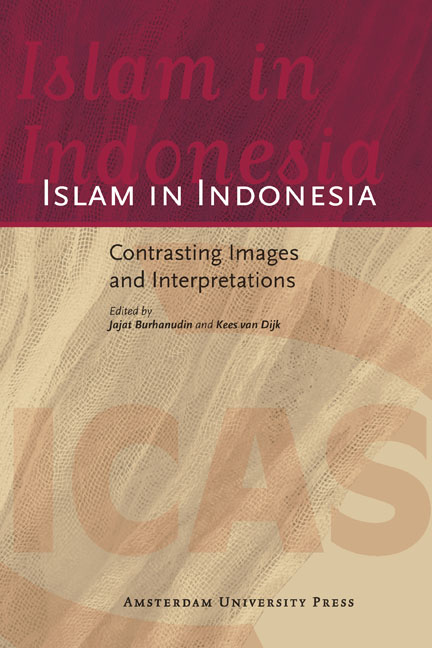Book contents
- Frontmatter
- Contents
- Introduction
- 1 Comparing Different streams of Islam: Wrestling with Words and Definitions
- 2 Defining Indonesian Islam: An Examination of the Construction of the National Islamic Identity of Traditionalist and Modernist Muslims
- 3 Indonesia in the Global Scheme of Islamic Things: Sustaining the Virtuous Circle of Education, Associations and Democracy
- 4 Distinguishing Indonesian Islam: Some Lessons to Learn
- 5 Islam, State and Society in Democratising Indonesia: A Historical Reflection
- 6 The Politics of Piety in the Pondok Pesantren Khusus Waria Al-Fattah Senin-Kamis Yogyakarta: Negotiating the Islamic Religious Embodiment
- 7 The Indonesian Muslim Feminist Reinterpretation of Inheritance
- 8 Managing Familial Issues: Unique Features of Legal Reform in Indonesia
- 9 A new Generation of Feminists within Traditional Islam: An Indonesian Exception
- 10 Religious Pluralism and Contested Religious Authority in Contemporary Indonesian Islam: A. Mustofa Bisri and Emha Ainun Nadjib
- 11 Islam and Humanitarian Affairs: The Middle Class and New Patterns of Social Activism
- 12 Dakwah radio in Surakarta: A Contest for Islamic Identity
- 13 Muslim Fundamentalism in Educational Institutions: A Case Study of Rohani Islam in High Schools in Cirebon
- 14 Majlis Tafsir Al-Qur’an and its Struggle for Islamic Reformism
- Glossary
- About the Editors and Contributors
- Bibliography
- Index
- Monographs
6 - The Politics of Piety in the Pondok Pesantren Khusus Waria Al-Fattah Senin-Kamis Yogyakarta: Negotiating the Islamic Religious Embodiment
Published online by Cambridge University Press: 09 January 2021
- Frontmatter
- Contents
- Introduction
- 1 Comparing Different streams of Islam: Wrestling with Words and Definitions
- 2 Defining Indonesian Islam: An Examination of the Construction of the National Islamic Identity of Traditionalist and Modernist Muslims
- 3 Indonesia in the Global Scheme of Islamic Things: Sustaining the Virtuous Circle of Education, Associations and Democracy
- 4 Distinguishing Indonesian Islam: Some Lessons to Learn
- 5 Islam, State and Society in Democratising Indonesia: A Historical Reflection
- 6 The Politics of Piety in the Pondok Pesantren Khusus Waria Al-Fattah Senin-Kamis Yogyakarta: Negotiating the Islamic Religious Embodiment
- 7 The Indonesian Muslim Feminist Reinterpretation of Inheritance
- 8 Managing Familial Issues: Unique Features of Legal Reform in Indonesia
- 9 A new Generation of Feminists within Traditional Islam: An Indonesian Exception
- 10 Religious Pluralism and Contested Religious Authority in Contemporary Indonesian Islam: A. Mustofa Bisri and Emha Ainun Nadjib
- 11 Islam and Humanitarian Affairs: The Middle Class and New Patterns of Social Activism
- 12 Dakwah radio in Surakarta: A Contest for Islamic Identity
- 13 Muslim Fundamentalism in Educational Institutions: A Case Study of Rohani Islam in High Schools in Cirebon
- 14 Majlis Tafsir Al-Qur’an and its Struggle for Islamic Reformism
- Glossary
- About the Editors and Contributors
- Bibliography
- Index
- Monographs
Summary
إِنٰ اللّهَ يَأْمُرُ بِالْعَدْلِ وَالإِحْسَانِ
Indeed God commands justice and the actualisation of goodness, realisation of beauty. Qur’an 16: 90 (translation by Omid Safi)
Introduction
In the contemporary world, despite the increasing predominance of secularism and modernity, the resurgence of religion, particularly in the public sphere, calls for further scrutiny. This serves as a counterparadigm, one that challenges the Cartesian and Kantian simplifying belief that, in modern society, the mind is the principal factor in the Enlightenment's awakening; that religion (which is regarded by some ‘modern’ people as irrational and emotional) is seen as something obsolete (see, e.g., Asad 1993; Mahmood 2005). In fact, nowadays ‘religion’ is richer than this logical-illogical determinism suggests, since it involves myriads of experiences and complexities of human life, ranging from the individual to the communal, from the cultural to the economic, from the social to the political. As such, religion and its aspects still attract critical analyses in the field of academe.
As the most developed academic fields concerned with the roles of religion and society, anthropology and sociology begin the process of scrutinising the interesting phenomenon of mind-body unification, which creates ‘piety’. My understanding of the term piety follows Mahmood (2001a: 226), who states: ‘piety here refers to more than one’s practical (and thus ‘secular’) conduct, than to inward spiritual states the term connotes in the English Puritan tradition’. In other words, piety does not stem from ‘morality’. Rather, it is the result of outward behaviour; in Foucauldian terms it is the ‘technology of the self’, which requires the discipline of ‘certain modes of training and modification of each individual, not only in the obvious sense of acquiring certain skills but also in the sense of gaining certain attitudes’ (Foucault 1997: 225). Turner (2008b: 43) clarifies that ‘piety involves above all a set of bodily practices for defining social relations that involve some degree of intimacy’.
Taking this as a starting point, over the last decades, many prominent anthropologists and sociologists have paid attention to the significant nexus between social actors, structures, embodied religious demeanour and the cultivation of virtuous selfhood (Mahmood 2005; Asad 1993; Winchester 2008; Hirschkind 2006).
- Type
- Chapter
- Information
- Islam in IndonesiaContrasting Images and Interpretations, pp. 91 - 108Publisher: Amsterdam University PressPrint publication year: 2013

